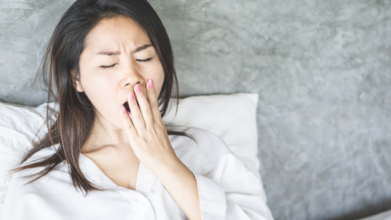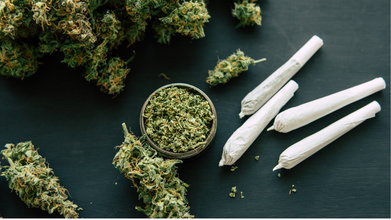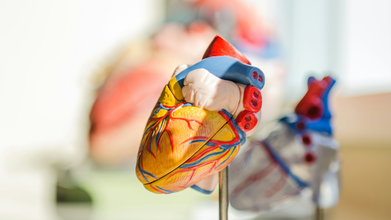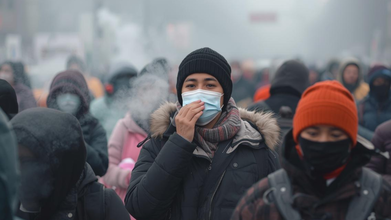- Health Conditions A-Z
- Health & Wellness
- Nutrition
- Fitness
- Health News
- Ayurveda
- Videos
- Medicine A-Z
- Parenting
What Happens To Your Body After 24 Hours Without Sleep, Doctor Explains

Credits: Canva
In 2025, sleep is often as a luxury, but the truth is it's one of the most basic fundamentals of health alongside food, water, and oxygen. However, most people don't realize how vulnerable the human body is when sleep is removed. Pulling an all-nighter might be a badge of honor at college or in late-night work marathons, but physicians caution that even a full 24 hours of skipping sleep can have deep—and sometimes hazardous—impacts on the brain and body.
So what actually occurs when you don't sleep? And how does the damage intensify the longer you're awake?
What Happens 24 Hours Without Sleep?
If you've been up an entire day, your body is already stressed out. According to Dr. Michael Gartner, a surgeon who regularly speaks on health issues, 24 hours of being awake can have you as mentally disabled as a person over the legal limit for being under the influence.
The Centers for Disease Control and Prevention (CDC) puts this state on par with a blood alcohol concentration of 0.1 percent. To put this into perspective, most U.S. states set their legal driving limit at 0.08 percent. This means your reaction time, memory, judgment, and coordination are impaired to the extent of actual peril.
Activities that demand attention—such as driving, machine operation, or making important decisions—become dangerous. Others even experience slurred words, slowed thinking, and fatigue that lasts into the next day. One sleepless night won't ruin your health, but it does simulate inebriation in ways most people undervalue.
The Body Begins to Deteriorate After 36–48 Hours Of No Rest
Push beyond 24 hours, and the body starts to revolt. At 36 hours, your brain will attempt to impose short "microsleeps"—mini comas lasting only seconds but occurring without notice. These events make tasks such as driving or cooking particularly dangerous. As you edge toward 48 hours of being awake, the symptoms escalate:
- Excruciating exhaustion dominates.
- Hunger grows as the body demands rapid fuel.
- Blood pressure can remain elevated, taxing the cardiovascular system.
- The stress hormone, cortisol, saturates your system, heightening anxiety and emotional instability.
Physicians also advise that hallucinations and confusion may start on about the 48-hour mark. At this point, sleep deprivation is deemed "extreme" and mental health dangers are as worrying as physical dangers.
Hallucinations, Delusions, Paranoia Hits After 72 Hours Of No Sleep
By the third day without sleep, the line between reality and imagination starts to blur. Hallucinations can escalate into paranoia. Thoughts may become nonsensical, conversations may lose coherence, and delusions set in.
Your body also suffers in a physical way. Reaction time drops, coordination fails, and the immune system drops, leaving you at higher risk of infection. The need to sleep is almost irresistible, but some simply fight it, pushing themselves into a state of near-psychosis.
The most extended time without sleep ever recorded—11 days—was accomplished by a 17-year-old in the 1960s under close medical supervision. Although he lived through it with no permanent damage, physicians caution against repeating the experiment because the brain and body both do vast amounts of damage at this point.
The Brain Goes into Crisis After 96 Hours or More Without Sleep
By the fourth day, the brain is in emergency mode. Dr. Gartner explains that memory processing after 96 hours of sleep deprivation is similar to early Alzheimer's disease. Irritability is at its peak, and psychosis-like symptoms worsen.
Perception of reality distorts, causing dangerous behavior. In other instances, there are long-term effects such as the possibility of chronic insomnia development. For the majority of individuals, attaining this level of deprivation is not sustainable without severe health consequences.
Why Sleep Matters Beyond Just Rest?
Sleep is not idle time—it's a biological imperative. In deep and REM sleep, the brain strengthens memory, removes toxins, and manages emotions. The body, in turn, fixes tissues, releases growth hormones, and stabilizes key functions such as metabolism and the immune system.
Long-term sleep loss, even at less severe levels, has been tied to obesity, diabetes, heart disease, and mood disorders. Without proper rest, cortisol and glucose regulation go haywire, setting the stage for metabolic disease.
And here's something important: you can't actually "catch up" on sleep during the weekend. Sleeping in on Saturdays and Sundays tends to confuse the body's internal clock, making individuals feel more tired and susceptible to insomnia.
When to Seek Medical Help?
It is normal for everyone to occasionally experience sleepless nights, but if sleep problems persist, they should never go unnoticed. If you are unable to sleep for hours, wake up and down all night long, or experience shifts in your mood and mental health, it might be time to see a doctor.
Sleep disorders like insomnia, sleep apnea, or restless leg syndrome are treatable but usually need a medical checkup. Your doctor may also eliminate underlying conditions, like thyroid disease or depression, that disrupt rest.
How to Develop Better Sleep Habits?
You don't have to spend money on fancy devices or supplements to sleep better. Opt for regular, science-supported habits instead:
- Establish a regular bedtime and wake-up time even on weekends.
- Restrict caffeine to morning use.
- Limit screens an hour or more before bedtime to minimize blue light exposure.
- Make your bedroom dark, cold, and quiet, replicating natural sleep environments.
- Nap strategically, keeping naps brief and earlier in the day.
- Exercise regularly, but not extremely close to bed.
- Minor lifestyle changes can contribute significantly to breaking the cycle of sleep deprivation.
A single night of no sleep will leave you slowed down, but after 24 hours, the body starts to have effects that are similar to intoxication. Go past 48 hours, and hallucinations, paranoia, and major health hazards come into play. At 96 hours, the brain itself starts to destabilize, hanging on the verge of psychosis.
Smoking Cannabis Can Lead To Mental Illnesses In Teenagers, Study Finds

Credit: Canva
Adolescents who use cannabis could face a significantly higher risk of developing psychotic (doubled), bipolar (doubled), depressive and anxiety disorders, a study shows.
Researchers from Kaiser Permanente, the Public Health Institute's Getting it Right from the Start, the University of California, San Francisco and the University of Southern California, who studied 463,396 adolescents ages 13 to 17 through age 26, found that children between these ages were extremely prone to developing mental illnesses.
Lynn Silver, MD, program director of the Getting it Right from the Start, a program of the Public Health Institute, and study co-author noted: "As cannabis becomes more potent and aggressively marketed, this study indicates that adolescent cannabis use is associated with double the risk of incident psychotic and bipolar disorders, two of the most serious mental health conditions.
"The evidence increasingly points to the need for an urgent public health response - one that reduces product potency, prioritizes prevention, limits youth exposure and marketing and treats adolescent cannabis use as a serious health issue, not a benign behavior."
"Even after accounting for prior mental health conditions and other substance use, adolescents who reported cannabis use had a substantially higher risk of developing psychiatric disorders - particularly psychotic and bipolar disorders.
"This study adds to the growing body of evidence that cannabis use during adolescence could have potentially detrimental, long-term health effects. It's imperative that parents and their children have accurate, trusted, and evidence-based information about the risks of adolescent cannabis use," Kelly Young-Wolff, Ph.D., lead author of the study and senior research scientist at the Kaiser Permanente Division of Research, added.
The observational US-focused study also found that cannabis use was more common among adolescents enrolled in Medicaid and those living in more socioeconomically deprived neighborhoods.
How Does Cannabis Usage In Teens Affect Overall Health?
Frequent, heavy cannabis use during adolescence can lead to long-lasting changes in brain function, impairing memory, learning, and attention. It can also cause reduced IQ and difficulty with problem-solving.Strong links have also been found between adolescent cannabis use and mental health issues, including increased risk of depression, anxiety, and, in some cases, schizophrenia or other psychotic disorders.
Additionally, smoking cannabis can lead to breathing problems similar to tobacco, such as chronic bronchitis. It can also cause an increased heart rate, and some studies suggest a higher risk of heart attacks.
Early initiation, especially before age 16, increases the risk of developing Cannabis Use Disorder (addiction). High-potency products can lead to rapid onset of withdrawal symptoms, mood changes, and even physical complications like Cannabis Hyperemesis Syndrome (severe nausea/vomiting)
Why Should Early Cannabis Usage Be Discouraged?
The Center of Disease Control and Prevention (CDC) explained that the brain of a teenager is still growing and developing a lot, and this process continues until they are about 25 years old. Using cannabis (marijuana) during the teen years and young adulthood can potentially harm this development.Compared to teens who don't use cannabis, those who do are more likely to drop out of high school or not finish a college degree. Using cannabis can cause several immediate and long-term problems for teens:
- Difficulty Thinking
- Memory Issues
- Poor Coordination
- Attention Problems
- School and Social Troubles
- Cannabis use can also lead to more serious issues that affect a teen's overall life.
- Increased Mental Health Risks
Driving under the influence of cannabis is illegal and unsafe, as it severely slows reaction time. Cannabis reduces coordination and concentration, impacting all the skills necessary for responsible and safe driving.
Around 30 percent of cannabis users are also known to develop an addiction (cannabis use disorder). Failing to quit or choosing the drug over family activities are signs. This risk is higher for frequent teen users.
Scientists Develop 3D Heart Model Which Can Beat Cardiovascular Diseases

Credit: Unsplash
Scientists have created a three-dimensional "heart-on-a-chip" (HOC) model that beats on its own, uses calcium to initiate muscular activity and responds predictably to common drugs in hopes that it will help fight against cardiovascular diseases and heart failure.
This engineered heart is the first to incorporate a dual-sensing platform that provides real-time tracking of activity throughout the heart tissue down to the cellular level, helping scientists measure cellular function, which is critical for preventing heart failure in patients with CVDs.
First author Ali Mousavi, a biomedical engineer at the University of Montreal: "The ability to observe the tissue's response to different compounds in real time represents a major advantage for preclinical development and translational research."
To create their heart-on-chip (HOC) models, researchers collected heart muscle and connective tissue cells from rats. They placed the cells in a gel rich in proteins and nutrients to help them grow, then put them onto tiny, flexible silicon chips.
To measure how the tissue worked, they used two types of sensors. First, they attached the engineered heart tissue between two small elastic pillars. Each time the tissue beat, the pillars bent slightly, and this bending showed how strong the heartbeat was.
Then they placed tiny, soft gel-based sensors inside the tissue. These very small droplets—about 50 micrometers wide—changed shape as the cells contracted. This allowed the researchers to measure mechanical stress at the level of individual cells.
Talking about this development, senior author Houman Savoji, a mechanical and biomedical engineer at the University of Montreal said: "This breakthrough brings us even closer to true precision health by giving us the ability to identify the most effective medication for each person before treatment is even administered."
The Rising Heart Attack Crisis
Heart attacks occur when blood flow to the heart is severely reduced or blocked due to a buildup of plaque which is made of fat, cholesterol and other substances in the heart's arteries.During a heart attack, a lack of blood flow causes the cells and tissue in the heart muscle to die, leading to irreversible damage that can result in serious complications like arrhythmias, heart failure, cardiogenic shock, or cardiac arrest.
It is one of the leading causes of death in the country. Four Indians experience a heart attack every minute, with one in four dying of the cause. Experts have also noticed a rising trend of nearly 50 percent of heart attack patients being under the age of 40, with half of all heart attacks in Indian men occurring under 50.
Coronary Artery Disease: The Silent KillerCoronary artery disease (CAD) is one of the most common illnesses that can cause a heart attack in people. It develops over years and has no clear signs and symptoms apart from a heart attack.
The illness begins due to a buildup of fats, cholesterol and other substances known as plaque in and on the artery walls.
Over time, this can cause narrowing or blockage of the coronary arteries and block the supply of oxygen-rich blood to the heart which can lead to chest pain (angina), shortness of breath and ultimately, heart attacks.
READ MORE: How This Chinese Medicine Can Improve Blood Flow In Angina Patients
Typically, those above the age of 45, having a biological family member with heart disease, lack of sleep, smoking, consuming saturated fats along with other autoimmune diseases such as lupus and rheumatoid arthritis, can increase the risk of developing CAD.
Nearly one in 10 Indian adults suffer from CAD and about two million people die from the disease annually. Apart from this, about 18 to 20 million American adults aged 20 and older are also affected about the disease.
How Much You Should Exercise To Prevent CAD?
The American Health Association recommends performing at least 150 minutes per week of moderate-intensity aerobic activity, such as brisk walking, dancing and gardening or 75 minutes per week of vigorous aerobic activity, such as hiking, running, cycling or and playing tennis or a combination of both, preferably spread throughout the week to maintain heart health.Moreover, regular exercise can also reduce the risk of Type 2 diabetes, high blood pressure, dementia and Alzheimer’s as well as several types of cancer. It can also help improve sleep, cognition, including memory, attention and processing speed.
Dr Hayes recommends opting for a cardiac evaluation such as an electrocardiogram, or EKG; a stress test; a cardiac MRI or CT scan to generate images of your heart if you notice changes in your ability to exercise or cannot perform consistent levels of exercise.
Air Pollution Is Leading You To Early Dementia, Scientists Say

Long-term exposure to tiny air pollution particles can significantly increase your risk of developing Alzheimer's disease-caused dementia.
Researchers from Emory University, US have found that constant exposure to PM2.5 can affect the brain more directly than scientists have assumed.
They noted: "Alzheimer's disease is the most common form of dementia and a growing public health challenge, especially in aging populations. Our findings suggest that PM2.5 exposure was associated with increased Alzheimer's disease risk, primarily through direct rather than comorbidity-mediated pathways."
The scientists also discovered that those who had suffered a stroke were at a slightly higher risk of developing Alzheimer's disease, suggesting that strokes may make the brain more vulnerable to air pollution.
"The observed effect modification by stroke may reflect an underlying biological vulnerability in cerebrovascular pathways. Stroke-related neurovascular damage can compromise the blood–brain barrier, facilitating the translocation of PM2.5 particles or their associated inflammatory mediators into the brain."
The observational study was released in PLOS Magazine.
When Does The Risk Increase?
A new IIT Delhi study suggests the air quality may be worse than what conventional surface monitoring stations capture.
During a post-winter-haze day in March 2021, the researchers measured the vertical distribution of fine particulate matter at 20-metre intervals from the surface up to 100 meters through drones.
At 100 meters, PM2.5 concentrations were around 160 micrograms per cubic meter which is about 60 percent higher than surface readings on the same days. They also found that humidity levels were also higher by 70 percent, which promoted the concentration of ammonium nitrate and chloride.
Additionally, the study found that PM2.5 levels increased sharply near the top of this shallow layer, leading to higher concentrations at around 100 metres.
Based on these observations, the researchers concluded that residents in 28–30-storey buildings may face higher exposure to pollutants and inorganic material than indicated by ground-based monitors.
They also noted that drone-mounted low-cost sensors are a much more effective tool for studying the lower atmospheric boundary layer to improve air quality monitoring, model evaluation and mitigation strategies in cities such as Delhi.
What Is Alzheimer’s Disease?Alzheimer's disease is one of the most common forms of dementia and mostly affects adults over the age of 65.
About 8.8 million Indians aged 60 and above are estimated to be living with Alzheimer's disease. Over seven million people in the US 65 and older live with the condition and over 100,00 die from it annually.
Alzheimer's disease is believed to be caused by the development of toxic amyloid and beta proteins in the brain, which can accumulate in the brain and damage cells responsible for memory.
Amyloid protein molecules stick together in brain cells, forming clumps called plaques. At the same time, tau proteins twist together in fiber-like strands called tangles. The plaques and tangles block the brain's neurons from sending electrical and chemical signals back and forth.
Over time, this disruption causes permanent damage in the brain that leads to Alzheimer's disease and dementia, causing patients to lose their ability to speak, care for themselves or even respond to the world around them.
While there is no clear cause of Alzheimer's disease, experts believe it can develop due to genetic mutations and lifestyle choices, such as physical inactivity, unhealthy diet and social isolation.
Early symptoms of Alzheimer's disease include forgetting recent events or conversations. Over time, Alzheimer's disease leads to serious memory loss and affects a person's ability to do everyday tasks.
There is no cure for this progressive brain disorder and in advanced stages, loss of brain function can cause dehydration, poor nutrition or infection. These complications can result in death.
© 2024 Bennett, Coleman & Company Limited

